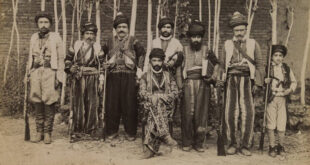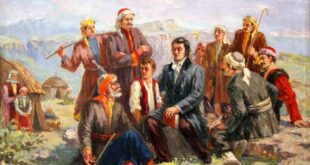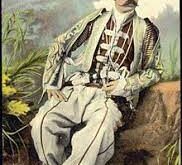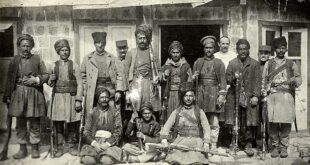Kurdistan in the shadow of Western betrayal: A critical historical overview
Kurdishaspect.com – By Kirmanj Gundi
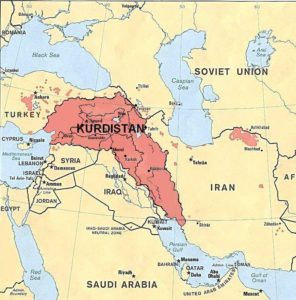
Introduction
Kurds are descendants of the Medes who are mentioned ten times in the Bible. In 700-550 BCE, the Medes created one of the mightiest empires, the Medean Empire. They were able to establish a new civilization in the region by creating the “Federation of Tribes.” Centuries later, Medes’ Federation of Tribes became a model for the proud Western societies, and was transformed into the “Federation of States.” The Medes were first to coin money and used it in transactions. They were more advanced than others in the Iron Industry in the region. The Medes used their craft to improve weaponry and improve their army. They also used iron for making vessels, bowls, pots, pitchers, ewers, and basins.
In 550 BCE, the Medean Empire became the Medo-Persian Empire and Cyrus (the Persian), who was the grandson of the last Medean Emperor (his mother was the daughter of the Medes’ Emperor) inherited the throne. As this transformation took place, the entire Medean culture, language, military strategies, and style of governance became the Persian tradition and remained intact in the hybrid empire. For centuries the Medes remained in power and position in the Medo-Persian Empire. However, the Empire gradually was transformed into the “Persian Empire.” And the history and culture of the Medes became the pride of Persians.
It was not until the arrival of Islamic influence in the region was the Medes’ identity weakened (of course, this is not to blame Islam for the disappearance of the Medes’ identity, but the Medes themselves). Yet, with the arrival of Islamic rule in the region, and the complete demise of the Sassanid Dynasty in Iran in 644 CE, all the native civilizations were affected. Islam superseded Zoroastrian religion, which was the main religion of the Kurds after their former religion Mithraism, was replaced by Zoroastrianism a few centuries before. Nevertheless, in the wake of this drastic regional transformation, slowly the word Medes disappeared and the word Kurds became a common reference to address them.
Division of Kurdistan between the Turkish and Iranian empires
As a result of the Chalderan War between the Ottoman Empire (Turks) and the Safavi Empire (Persians) in 1514-1639, for the first time Kurdistan was divided between the two empires. Although, this division did not affect normal Kurdish daily life, the political dogma of the two empires favored the disappearance of the word Medes, because, it allowed the Persians to not only claim the entire history and culture of the Medes, but also to show the descendants of the Medes, the Kurds, as one of their subjugated groups. As for the Turks, it became easier for them to shatter the Medes’ history by denying the Medean Empire ever existed.
British and French betrayal
Further, following the Treaty of Sykes-Picot, after the WWI in 1918, to support their own colonial interests, Britain and France, repartitioned Kurdistan amongst Iran, Turkey, and two newly established Arab states Syria and Iraq. This division gravely impacted every aspect of Kurds’ life. The Kurds were compelled to carry four different passports and practiced three alien cultures—exercising their native culture became taboo for them. This, emphatically, was a new form of enslavement of the people of Kurdistan.
In these four racist nations, the Kurdish national identity became parts of national identities of Iran, Iraq, Syria, and Turkey. In the newly established geo-political map in the Middle East, the Kurds were not only denied their national rights, but also subjected to the policy of cultural and physical genocide and annihilation. Nonetheless, the people of Kurdistan, although oppressed, valiantly defended their identity. In 1924, in the Turkish occupied Kurdistan, Şêx se’îdî Pîran led the liberation movement. In 1929-1931, General Îĥsan NȗrÎ Paşa led the Kurds towards independence. In 1937, Seyîd Reza in Betlîs challenged the Turkish oppressors for the independence of Kurdistan. All these movements were faced with the most inhuman and savage measures by the Turkish state and were defeated. In 1946, the Republic of Kurdistan was declared under Pêşewa Qazî Mohammad in the Iranian occupied Kurdistan. However, in less than a year, the republic was vanquished and the Iranian occupying forces reestablished control over Kurdistan. In the Iraqi occupied Kurdistan, in the 1930s, Sêx Mehmudî Berzingî fought the British-supported Iraqi monarch for the creation of kingdom of Kurdistan. This movement was brutally suppressed by the British Royal Air Force.
The US betrayal
Perhaps the most heartbreaking attempt for Kurdish freedom occurred in the Aylool Revolution, which started in September 1961 under the leadership of General Mustafa Barzanî and lasted until 1975. In 1975, an international conspiracy through the mediation of Henry Kissinger, the then Secretary of State took place in Algiers and is known in the Kurdish history as the “Algiers Agreement.” In reality, it should be known as “the Algiers Betrayal.” A few years before, in 1972, American administration had convinced the Kurdish leadership that America would assist them to achieve autonomy within the Iraqi state. However, three years later in Algiers, America breached its “honor” and betrayed the Kurds. In the agreement, Henry Kissinger, “the Master of Treachery,” brought the two adversaries, Iraq and Iran, to the negotiating table, and agreed to stop providing aid and pursuing the goal of Kurdish autonomy.
General Barzanî sent a desperate plea to Kissinger and asked him for the US aid. He stated, “Our movement and people are being destroyed in an unbelievable way with silence from everyone. We feel, Your Excellency, that the United States has a moral and political responsibility towards our people, who have committed themselves to your country’s policy. Mr. Secretary, we are anxiously awaiting your quick response.” Again, Barzani’s plea was ignored by the US officials, and no one replied. Additionally, Kissinger turned down repeated Kurdish requests for humanitarian aid for their thousands of refugees.
The American betrayal brought human catastrophe to the people of Kurdistan. The Kurdish Leadership under General Barzanî had put all its trust in America at the time and was looking up to America to shed the light of her democratic principles on the Kurds in the larger Middle East. Nonetheless, when Kissinger testified before the US Congress, he was asked about the sudden change in the US policy regarding the Kurdish abandonment, he callously replied “One should not confuse the business intelligence with missionary work.” Subsequently, in an Op Ed piece he wrote for the New York Times, Kissinger criticized American leaders that they were no longer giving Iraq “the attention it deserved.”
This duplicity and heartless act of American officials might never have surfaced if it were not for an investigation in 1975 by the U.S. Congress Select Committee on Intelligence, which was chaired by New York Democrat, Congressman Otis Pike. In his investigation, Congressman Pike concluded that neither Tehran nor Washington wanted the Kurds to prevail. He further concluded that the Kurds were never more than “a card to play.” A useful tool, which the US used to weaken Iraq’s “potential for international adventurism.” The Pike Committee also reported that “The Kurds were encouraged [deceived] to fight solely in order to undermine Iraq.” After the abandonment of the Kurds by the US, Barzanî revealed his view to the media outlets and said “We did not trust Shah of Iran, but we trusted America.” General Barzanî believed that America was “too great a power to betray a small people like the Kurds.”
Iraqi destructive policies escalated in Kurdistan
Although the people of Kurdistan restarted resistance against the Iraqi occupying forces in 1976, the resistance never regained the strength it had in the Aylool Revolution. The policies and practices of devastating Kurdistan by the Iraqi government escalated, particularly in the 1980s, when Saddam Hussein’s despotic and bloody regime unleashed eight phases of the so-called “Anfal” operations to uproot Kurdish roots and depopulate Kurdistan by indiscriminately practicing the policy of genocide against the people of Kurdistan including women, children, and elderly. The Anfal operations caused the disappearance of some 182 thousands of innocent people and the destruction of about 4,500 villages of Kurdistan. The Halabja chemical bombardments marked the pinnacle of the Iraqi regime’s savagery against the defenseless people of Kurdistan. Ironically, all the atrocities were taking place against this ancient people on the UN, USA, and EU watch. No superpower took notice of the annihilation that was taking place in that part of Kurdistan. Perhaps, this was because, in the 1980s, the Western powers needed Saddam Hussein to face the aggression of the newly established Islamic Republic of Iran after the demise of Shah’s regime. The people of Kurdistan were once again the scapegoat of myopic and inhumane Western interests.
The US betrayed the Kurds again
In 1991, when America formed a strong international coalition against Iraq’s occupying forces in Kuwait, George H. Bush, the US President at the time, called upon the Iraqi people to resist and stated, “There is another way for the bloodshed to stop, and that is for the Iraqi military and Iraqi people to take matters into their own hands, and force Saddam Hussein, the dictator, to step aside; and then comply with the United Nations’ resolution and rejoin the family of peace-loving nations.” Sadly enough, when the Kurds in the North (Kurdistan) and the Shi’ites in the South rose up against the “dictator,” George H. Bush turned his back on them and allowed the Iraqi military forces to literally slaughter them. After crushing the Shi’ite uprising in the South, the Iraqi regime threw its force against the people of Kurdistan and as a result some two million Kurds fled into the mountains to escape an imminent death. Although, they escaped from Saddam’s death sentence, hundreds lost the battle to the bitter cold in the mountains on a daily basis. It created an international outcry. This, certainly, was another US betrayal of the people of Kurdistan.
A new beginning for the US-EU-Kurdish cooperation
Not until the humanitarian crisis of the mass exodus with its attendant price of hunger, illness and death by exposure created an international outcry did the Bush administration along with France and Britain create a Safe Haven for the Kurds in some parts of Kurdistan; and when they created a safe haven, they left some 51% of Kurdistani territories including Kirkuk under Iraqi occupying forces. Although the areas that were traditionally Kurdistani territories were not included in the safe haven, this was the first real experience for the people of Kurdistan to establish their own viable administration with four branches including presidency, premiership, parliament, and judicial system. This Kurdish administration soon became a de facto government with literally no ties to Baghdad until 2003.
In spring 2003, when George W. Bush, the son, decided to remove Saddam Hussein’s regime, America needed Turkey’s assistance to let the US forces to pass through Turkey and into Iraq. Surprisingly though, the Turkish Parliament gave the US a cold shoulder by rejecting the US request. Once Bush’s plan A was defeated, America needed to come up with the plan B, which was asking the Kurdish leadership for cooperation. In the plan B, America received more than she had bargained for. The Kurdish Pêşmerge forces became the US “foot soldiers,” and alongside the US forces moved to remove the bloody and brutal regime of the tyrannical Saddam Hussein.
While Americans were harassed and murdered in other parts of Iraq, they were enjoying the hospitality of the Kurds and the serenity of Kurdistan. The only sad and regrettable incident has ever happened in Kurdistan that involved an American life was the untimely death of Jeremiah Small, a teacher of the school of the Medes at the hand of one of his teenage Kurdish students (who also killed himself) on March 1, 2012 in Slêmanî. Jeremiah’s death troubled the people of Kurdistan everywhere. He will remain in the thoughts and prayers of our people for many years to come.
The US should polish its policy towards the Kurds and support their independence
Against all odds in the region, the people of Kurdistan and their leadership have done their due diligence to strengthen the US policies to transform Iraq to a functioning civil society. Nevertheless, America has yet to tell where the Kurdish issue stands in its wider strategy for Iraq and the larger Middle East. The Kurdish leadership has not only allowed America to utilize the Kurdish territories to promote US policies, but also invited the Western oil companies, especially American oil companies (i.e., Exxon Oil Company) to exploit the natural resources of Kurdistan. The Kurds and their leadership have been loyal and sincere in their association with the US and wanted America to triumph. They are interested in preserving and promoting the Kurdish-American ties to higher end. In the last two decades, the Kurdish leadership, by all accounts, has succeeded in maintaining a healthy relationship with the Western world, particularly with the United States. Therefore, the island of Kurdistan is the “dream bargain” for the West to bet on. It is an island full of natural resources and located in the most strategic region in the Middle East. Its people belong to the Indo-European family of nations. The people of this beautiful island are loyal and reliable. They deserve Western, especially American commitment to support their independence. Kurdistan is the last reliable island after Israel, where not only the government, but also the people are pro-West.
Conclusion
In conclusion, the division of Kurdistan amongst Iran, Iraq, Syria, and Turkey is the direct result of Western collusion in pursuit of its colonial and neo-colonial goals. Kurdistan could not have been divided if it were not for the hypocrisy and duplicity of the Western superpowers. After more than nine decades in allowing these racist nations to subject the Kurds to the policy of genocide, one could say it is about time for the Western powers, especially America to revisit their outdated policies vis-à-vis the Kurds and correct them by supporting independence of Kurdistan. Additionally, Americans’ first-hand experience with the Arabs in Iraq since 2003 has proven more often than not that, it is not easy to establish a working relationship with the Iraqi Arab society due to the deep sectarian and ideological division, and the chauvinistic and myopic political culture. Therefore, it is in the interests of the Western nations to support independence of the people of Kurdistan. It is important that the Western political mentality rises above the paranoia created by the regional countries against the Kurdish statehood. Future reality will prove that to stabilize the larger Middle East is to support Kurdish independence. It is the only just solution. This eventually enables America to remain in the region in this beautiful island in peace and tranquility while saluted by the loyal and friendly people of Kurdistan.
 History of Kurdistan
History of Kurdistan
